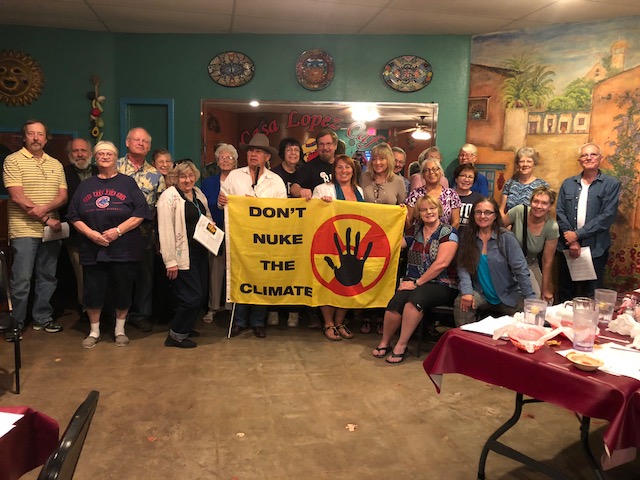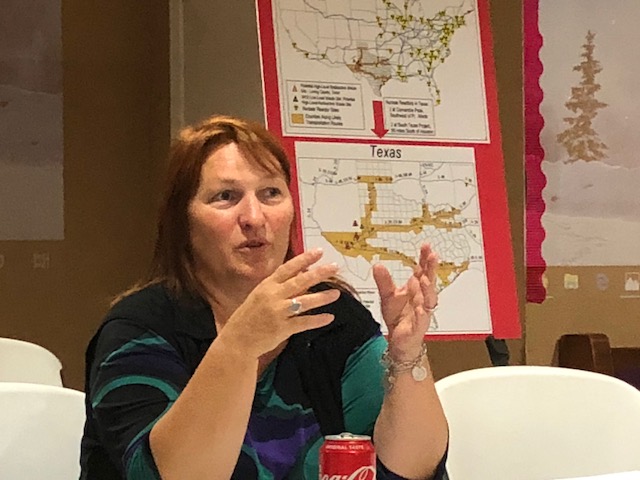 Nuclear waste may soon be coming through your city. But you can speak out and say, “No!”
Nuclear waste may soon be coming through your city. But you can speak out and say, “No!”
The public has until October 19th to speak out against a plan to dump dangerous radioactive waste in Texas from nuclear reactors around the country.
A High Level Radioactive Waste Dump?
A high-risk, high-level radioactive waste dump has been proposed in West Texas, and people across the state are speaking out against it. And they are not only speaking out against the dump. They are also speaking out against the transportation of high level radioactive waste across the state. Transporting this waste could put people’s lives at risk to leaks, accidents, and other threats.
In Houston, Public Citizen has worked with Coalition of Community Organizations, Sustainable Energy & Economic Development (SEED) Coalition and Nuclear Information and Resource Service (NIRS) to bring awareness to the issue of high-level nuclear waste transport in Texas. Together, these organizations kicked off the “Protect Texas from Radioactive Waste” Tour in Houston in late September.
 At a community meeting in Fifth Ward on Sept. 24th and a press conference near downtown on Sept. 25th, Karen Hadden shared details on the proposal and its potential impact on communities around the state.
At a community meeting in Fifth Ward on Sept. 24th and a press conference near downtown on Sept. 25th, Karen Hadden shared details on the proposal and its potential impact on communities around the state.
The Plan
What’s the plan? Some 40,000 tons of irradiated fuel rods from nuclear reactors around the country would be brought to Texas and stored at an existing low-level radioactive waste site for 40 years or longer.
What’s at risk? By creating a consolidated interim storage facility, a permanent disposal facility may never be created. Deadly nuclear waste must be isolated from people and the environment for a million years. Exposure to radiation can cause cancer, genetic damage and birth defects, and being close to unshielded waste is lethal.
Diane D’Arrigo, Radioactive Waste Project Director with Nuclear Information Resource Service, discussed how the Nuclear Regulatory Commission (NRC) held only one meeting in all of Texas on the original application, over a year ago in West Texas. By contrast, the NRC hosted five meetings this year in New Mexico for a similar high-level radioactive waste proposal by Holtec for a site near Carlsbad and two dozen for a proposed Nevada dump. Texan voices are being left out of the process. The NRC needs to let the voices of Texans be heard by holding public meetings across the state: in Houston, San Antonio, Dallas/Ft. Worth, El Paso and Midland, where people would be at risk from potential radioactive waste transport accidents.
 Kerstin Rudek, from Gorleben Germany, spoke about the high-level radioactive waste storage experiences of her community and warned people to fight.Waste Control Specialists’ re-started license application with the Nuclear Regulatory Commission (NRC), which has created a brief time for public input. The group shared that public opposition has stopped the siting of radioactive waste dumps in the past, and it can be done here.
Kerstin Rudek, from Gorleben Germany, spoke about the high-level radioactive waste storage experiences of her community and warned people to fight.Waste Control Specialists’ re-started license application with the Nuclear Regulatory Commission (NRC), which has created a brief time for public input. The group shared that public opposition has stopped the siting of radioactive waste dumps in the past, and it can be done here.
A single train car could carry as much plutonium as was dropped on Nagasaki. While not in bomb grade form, radioactive waste could leak and cause catastrophe for communities living its wake. There is no need for deadly waste to come through Houston or any other community in Texas.
Public health and safety, including protection of the millions of people here in Houston, should take precedence over the potential profits of a company that wants to bring deadly nuclear reactor waste to Texas
Rail lines run close to many homes, schools and businesses and insurance policies generally don’t cover radiological impacts. An accident with a radiation leak could cause disaster, impacting our health and costing billions of dollars to remediate. The NRC should protect Texans’ health and safety and deny the license application.
Traveling from Gorlaben, Germany, Kerstin Rudek shared her story:
“Our rural farming community was targeted to take high-level radioactive waste in Gorleben, Germany, and in 2011, we stopped the the nuclear industry from bringing transports to our area with protests on the streets and on the railroads with 50,000 people,” said Kerstin Rudek. “We have serious concerns about risks to our health, our water, and our food. There’s been massive opposition, even from conservative people who never took action before. We don’t want the dangerous waste that is being dumped on us. I am here to share our successes and hope that Texans can prevent being dumped on!”
Texans Have Options
What could we do instead? The least risky approach to dealing with high-level radioactive waste would be to keep it at reactor sites, or nearby, for now and use more robust canisters and casks. There’s no need to move the waste anywhere and no need to centralize the waste, since a permanent repository is not available. Spent nuclear fuel can be kept onsite in dry storage for 60 years after reactors cease operating.
To learn more, go to www.NoNuclearWaste.org.
 The public can comment on the license application until Oct. 19th. Comments on WCS/ ISP’s Consolidated Interim Storage Facility should include Docket ID NRC-2016-0231, and be emailed to WCS_CISF_EIS@nrc.gov. Comment letters can also be sent from www.NoNuclearWaste.org.
The public can comment on the license application until Oct. 19th. Comments on WCS/ ISP’s Consolidated Interim Storage Facility should include Docket ID NRC-2016-0231, and be emailed to WCS_CISF_EIS@nrc.gov. Comment letters can also be sent from www.NoNuclearWaste.org.
The public can also submit requests for a hearing and petition to intervene in the licensing proceedings until October 29th. Information is available on the August 29, 2018 Federal Register






